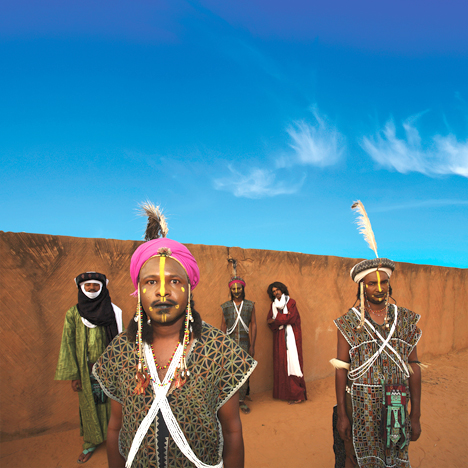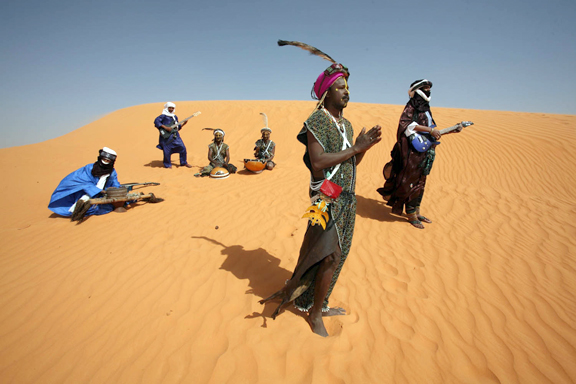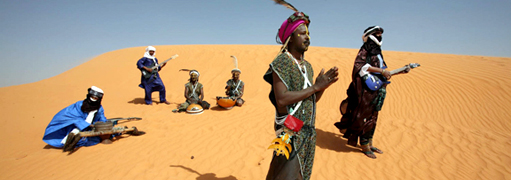Niger, a landlocked West African country roughly twice the size of Texas, is one of the poorest places in the world. Mostly covered by desert, this hot, dusty zone is home to multiple ethnic groups, many of which are still nomadic. They lead their camels, cattle and goats along the edge of the Sahara in search of savanna pastures and water sources, sometimes clashing over limited resources. Two such groups are the Tuareg and the Wodaabe, who each have their own histories, social structures and religious beliefs. Although the climate is harsh and the habitat is barren, Nigerian cultures are fertile with arts, crafts, dance and music traditions. In 2004, members of the Tuareg and Wodaabe tribes formed the band Etran Finatawa to play at the Festival Au Desert held annually near Timbuktu, Mali. Each member combined styles and instruments from their background and the resulting mashup was a hit. The band has toured the globe, first playing the U.S. in 2008. The only group in the world combining the two cultures, Etran Finatawa is comprised of two Tuareg and three Wodaabe musicians. Lyrics are sung in the Tuareg language, Tamashek, and the Wodaabe language, Fulfulde. The band’s mission is to be a symbol of peace and reconciliation, and it hopes to spread the message of getting along through the integration of its people’s musical heritage. Faced with the possible erosion of their customs, Etran Finatawa works to keep them alive by weaving the ancient with the modern.The Wodaabe are known for their intricate polyphonic singing, high-pitched solos and call-and-response styles, accompanied by calabasse gourd drums. The major instruments of Tuareg music are the violin-like anzad and the goat skin-covered tende drum. Hand clapping and ululations add extra percussion. Etran Finatawa also uses electric guitars and bass alongside the more traditional instruments. The songs are about everything from beautiful women, to family, to poverty and hardship, and all are rooted in nomadic life. Although they are about life in a specific place, they are relatable to anyone who has experienced loneliness, joy or beauty—and anyone who likes a good groove. By turns, the music conjures a sense of wandering, the impulse to dance and the camaraderie of singing around a campfire. This unique blend of sound has been dubbed “nomad blues.”Etran Finatawa’s new album, Tarkat Tajje / Let’s Go! , released in March, introduces listeners to the style. The first track, “Aitimani,” opens with a bemused voice saying “OK,” followed by a smoky blues guitar line that’s soon joined by a distinctly African-sounding drum. Several songs on the record begin with the bluesy guitar, but all evolve into different, surprising mixtures. Not everything is identifiable. Upon closer listening, what seemed to be a tambourine sounds more like heavy bits of metal inside a jar. The multivoiced chants and handclaps drive the music forward, so even sad songs are tinged with an uplifting feeling. Spreading ideas of hope and possibility should be no problem for Etran Finatawa.
Etran Finatawa Wednesday, July 14, 7:30 p.m. The Cooperage7220 Lomas NETickets: $15 advance, $20 at the doorbrownpapertickets.com, (800) 838-3006 Thursday, July 15, 7:30 p.m. Santa Fe Brewing Company35 Fire Place, Santa Fe Tickets: $17 advance, $20 at the doorticketssantafe.org, (505) 988-1234











